2015 Lawyers’ Hall of Fame
Hall of Fame Class – 2015
- Abe Berkowitz (1907-1985)
-
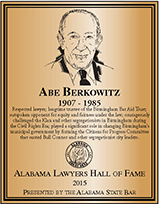
Abe Berkowitz is remembered as one of Birmingham’s earliest progressive activists, promoting both economic expansion and social justice throughout his career. He was born in Meridian, Mississippi, on November 7, 1907, the child of Jewish immigrants from Lithuania. The family ultimately settled in Birmingham, where his father ran a small retail business. Abe attended Phillips High School and The University of Alabama. He received his law degree in 1928 before reaching the age of 21 and began practicing immediately after the Alabama Legislature removed his disabilities of non-age.
Abe was an outspoken opponent of racism and the Ku Klux Klan throughout his career. He was an active proponent of equity and fairness under the law. He frequently wrote and signed letters to the editors of Birmingham newspapers pointing out injustices and demanding legislation to correct wrong-doing in the community. He publicly supported an anti-masking bill in the Alabama Legislature aimed at the Klan, which became law in 1949. He also challenged the racist positions of Birmingham’s leaders such as Bull Connor, whose conduct as Police Commissioner would besmirch Birmingham’s reputation throughout the world.
In 1962 he was a leading member of the Birmingham Bar Committee that recommended a change in the form of Birmingham’s city government from its three-member Commission to a Mayor-Council form. He hosted the meetings to implement the plan of action to obtain signatures calling for a referendum. The election was successful and Birmingham entered a new era with new leaders and a new form of government in 1963, ironically just as Bull Connor’s actions were drawing negative national attention.
As an outspoken proponent for both economic and social progress in Birmingham, Abe Berkowitz mentored several other prominent lawyers who also contributed to reshaping the city of Birmingham. One of the most well known of his proteges was David Vann, who would become a city councilor and later mayor and who is also an inductee of the Alabama Lawyers’ Hall of Fame. Throughout his career, Berkowitz was a leader of the bar. In 1954, he helped establish the Birmingham Bar Association Aid Trust which set up a fund for lawyers in distress and for which he served as a trustee for more than 30 years. For his lifetime of civic involvement, his fearless support of rights for all and his service to the bar, Abe Berkowitz is welcomed as a member of the Alabama Lawyers’ Hall of Fame.
- Reuben Chapman (1799-1882)
-
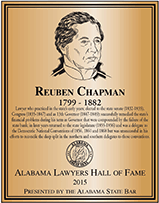
Reuben Chapman was among those young attorneys who arrived in Alabama during the earliest years of statehood, seeking opportunity and advancement in an environment that seemingly offered unlimited potential to the ambitious. At a steady pace, he climbed the economic and political ladders to become a prominent planter and to serve the state in the legislature, Congress and the Governor’s Office. In each of his public offices, Chapman sought to buttress the stability of Alabama’s Cotton Kingdom and to maintain unity in his Democratic Party.
A native of Virginia, Chapman arrived in Huntsville in 1824 to study law in the office of his brother Samuel. After becoming well established in a law practice, he acquired cotton plantations in both the Tennessee Valley and the Black Belt and was soon a prominent slaveholder. Along the way he married Felicia Pickett and with her had six children.
Chapman entered the political arena in 1832 with election to the Alabama Senate. Three years later, his reputation for collegiality and devotion to the Democratic Party helped secure a seat in the U.S. House of Representatives, where he would serve for 12 years. During the 1847 gubernatorial election, Alabamians divided over the proper response to failure of the State Bank and Chapman was tapped as a compromise candidate to chart a moderate course forward.
In the Governor’s Office, Chapman pursued policies to shore up the state’s dire financial condition — placing the Bank of Alabama in hands of a commissioner who would steadily reduce its debt, vetoing railroad legislation that granted tax exemption and seeking to reduce the tax exemptions on land purchased from the federal government. Of particular significance was his appointment of Alabama’s first state geologist, who would chart the mineralogical wealth of the Jones Valley and thereby point toward the industrial potential that would be realized by Birmingham.
Chapman left public office in 1849 and spent the next decade building his agricultural interests. Although he had been an ardent defender of slavery’s expansion while governor, the secessionist mood of 1860 was too radical for Chapman. He joined the unsuccessful effort to promote unity and compromise between northern and southern Democrats but ultimately pledged to support the Confederacy. The war cost Chapman a son who was killed in battle and his home that was burned by Huntsville’s federal occupiers. He would live 17 more years rebuilding his sizable estate.
For his contributions to the early development of Alabama, seeking economic stability in a climate of crippling instability, recognizing the importance of Alabama’s natural resources and being a voice of compromise in a polarizing environment, Reuben Chapman is honored by the Alabama State Bar by his selection to the Alabama Lawyers’ Hall of Fame.
- Martin Leigh Harrison (1907-1997)
-
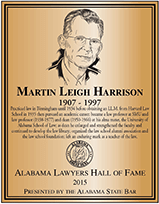
Martin Leigh Harrison served on the faculty of The University of Alabama School of Law for 39 years. He served as dean of the law school from 1950 to 1966, retiring as the university’s first Distinguished Professor of Law in 1977. He remained at the law school an additional four years doing research and writing, sharing his sound judgment and knowledge with those wise enough to seek his counsel.
Harrison was a brilliant student. He earned his AB degree and Phi Beta Kappa Key at The University of Alabama in 1927 at 20 years of age, and his LL.B in 1929. He entered the private practice of law in Birmingham, distinguishing himself again as an accomplished appellate lawyer for six years.
Harrison had no lawyers in his background when he decided to study law to see if he liked it. He indicated he was “hooked” after one week of study. After his period of practice, he “had the feeling,” which he nurtured, that he was best suited to teach law. He entered Harvard University and earned an LL.M in 1935. He then began a legendary law teaching career when he became an instructor in law at Southern Methodist University until an opening two years later allowed him to return to his alma mater.
Leigh Harrison’s genetic makeup was that of a scholar and teacher. He was the son of a highly respected superintendent of education. His two siblings were honor graduates who taught and served at the college level. His son and daughter, like their father, taught and served at the college level.
He had attained the rank of professor of law when he accepted the dean’s position. Those 16 years saw admission requirements increase, two expansions to Farrah Hall, a tripling of the law school library holdings, the hiring of the law school library’s first lawyer librarian and the establishment of the Alabama Law Review. The vision of Dean Harrison in realizing that state support alone could not maintain the quality law school Alabama needed to attract gifted students led to the creation of the Law School Foundation, Law School Alumni Association and Farrah Law Society to provide outside support from the profession and friends of the school to supplement programming and faculty research. These entities today have sustained the law school’s continuing rise in reputation for an excellent legal education.
Dean Harrison felt a duty to guide the law in its development. He had a most profound influence on Alabama law and practice through his service in the early 1970’s as staff director of the Alabama Constitutional Revision Commission, from which came the adoption of a new Judicial Article to the Alabama Constitution under which Alabama’s highly regarded Unified Judicial System was created.
It is impossible to overlook Leigh Harrison’s administrative skills and accomplishments as dean. However, it was his love of teaching and his ability to communicate the fine points of the law that allowed his students to become outstanding lawyers. It was his relentless and sometimes merciless drive to instill the fundamentals of law and sharpen the edges of his students’ understanding of its finer points that gave rise to his nickname the “Tiger.” His pursuit of a point of law was akin to a tiger’s stalk for the final pounce. His teaching method included a quiet, systematic, logical, non-diverting and moving concentration.
The Alabama State Bar inducts into its Lawyers’ Hall of Fame a world-class teacher of the law, a visionary dean of The University of Alabama School of Law, a constitutional reformer, a native son born in Opelika and a devoted husband of 59 years to Barbara Sinclair Harrison. His life when judged by its usefulness to others was great. His effectiveness was not so much in what he did, but what he was: a modest man of intellect and integrity.
- Holland McTyeire Smith (1882-1967)
-
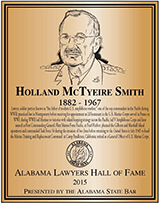
Holland McTyeire Smith was born on April 20, 1882, in Russell County, Alabama, the son of attorney John Wesley Smith, Jr., and Cornelia Caroline McTyeire. Smith graduated from Alabama Polytechnic Institute (Auburn) in 1901 and The University of Alabama School of Law in 1903. He practiced law with his father for a year before he was appointed a Marine 2nd Lieutenant in 1905. During officer training at Annapolis he met his future wife, Ada Wilkinson. The couple was married in 1908. They would later have a son, John V. Smith, who would become a Rear Admiral in the Navy.
Early in his career, Holland Smith served in the Philippines. Due to his hard-driving style and occasional profane outbursts he earned one of the most enduring nicknames in military lore — “Howlin’ Mad.” His gruffness and impatience with inefficiency and delay of schedules was legendary.
Smith served in France during World War I and saw action in several battles as the war was coming to a close. During the interlude between World War I and II, he held a number of postings and served in different capacities within the Marine Corps. It was during this period that Smith formulated his vision for the Marines as the appropriate fighting group to perform amphibious landings. He convinced naval leaders of the need to adopt the Higgins boat as the shallow draft landing craft for amphibious operations. Due to his efforts he is credited as being the “Father of Amphibious Warfare.”
Holland Smith’s greatest service to his country occurred in World War II during the “island-hopping” campaigns against the Japanese in the Pacific. He commanded and oversaw the training of Marine amphibious forces in such battles as the Gilbert and Marshall Islands and Saipan. He was also Alabama’s highest ranking officer in World War II. A Lieutenant General when he retired from the Marine Corps in 1946, Holland Smith received his fourth star as he was promoted to General on the retired list for having been especially commended in combat.
After 41 years of dedicated military service, General Smith retired to La Jolla, California. The 1949 movie Sands of Iwo Jima starred John Wayne and featured Holland Smith portraying himself. In 1955, Smith hosted Uncommon Valor, a gritty television series on WWII and the Korean War. General Holland Smith died on January 12, 1967, and is buried at Ft. Rosecrans National Cemetery overlooking the San Diego harbor. It is with gratitude for his service that the lawyers of Alabama welcome General Holland McTyeire “Howlin’ Mad” Smith to the Alabama Lawyers’ Hall of Fame.
- Frank Edward Spain (1891-1986)
-
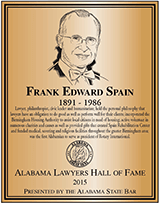
Frank Edward Spain is an outstanding example of a lawyer who used his talents and largesse to serve and improve his community. He was born on October 11, 1891, in Memphis, Tennessee, and was the son of a Methodist minister who served numerous churches in the South from Alabama to Texas. Frank Spain received his undergraduate degree at Southern University in Greensboro, Alabama, and his law degree in 1913 from The University of Alabama School of Law. Spain became an Assistant City Attorney in Birmingham and then served as an artillery officer in France during World War I. Upon his return from the service in 1918, he joined the firm that would carry his name, which is currently known as Spain & Gillon, LLC.
In the 1920’s he became associated with the business that is today known as the Liberty National Life Insurance Company. He served as General Counsel, a Vice President and a member of the Board of Directors. Frank Spain was an early investor in the company and over the years he became a wealthy man.
Spain was a leader in the Birmingham business community. He served as chairman of the Jefferson County Community Chest, which later became the United Way. He was president of the Alabama Motorist Association, now known as AAA Alabama. He became chairman of the Housing Authority of Birmingham and served as president of the Birmingham Chamber of Commerce. Spain was an active member of the Rotary Club of Birmingham and he became president of the club, district governor and ultimately the President of Rotary International in 1951-52.
In addition to his leadership and community involvement, Frank Spain is most remembered for his generous philanthropy. His gifts and those of his wife, Margaret Cameron Spain, created the Spain Rehabilitation Center and the Spain Heart Tower at UAB, the Spain Community Services Building, the Frances Spain Hodges United Way Building and the Frank Spain Boy Scout Camp. He supported many other projects at other agencies, institutions and churches.
Frank Spain was a distinguished lawyer, businessman and public-minded citizen. It is with great pleasure and admiration that he is recognized by the Alabama State Bar as a member of its Alabama Lawyers’ Hall of Fame.